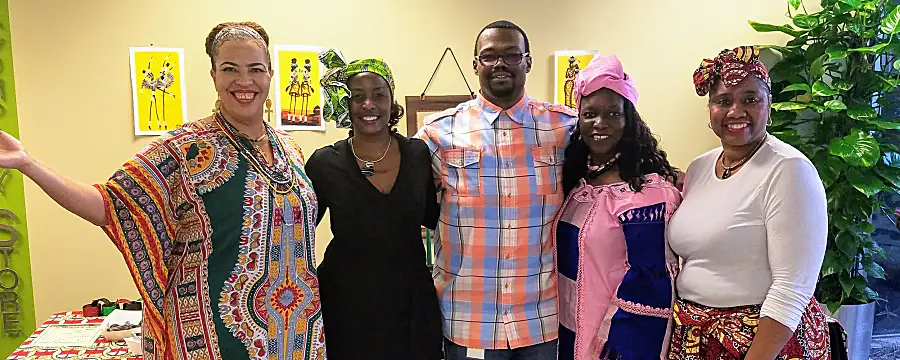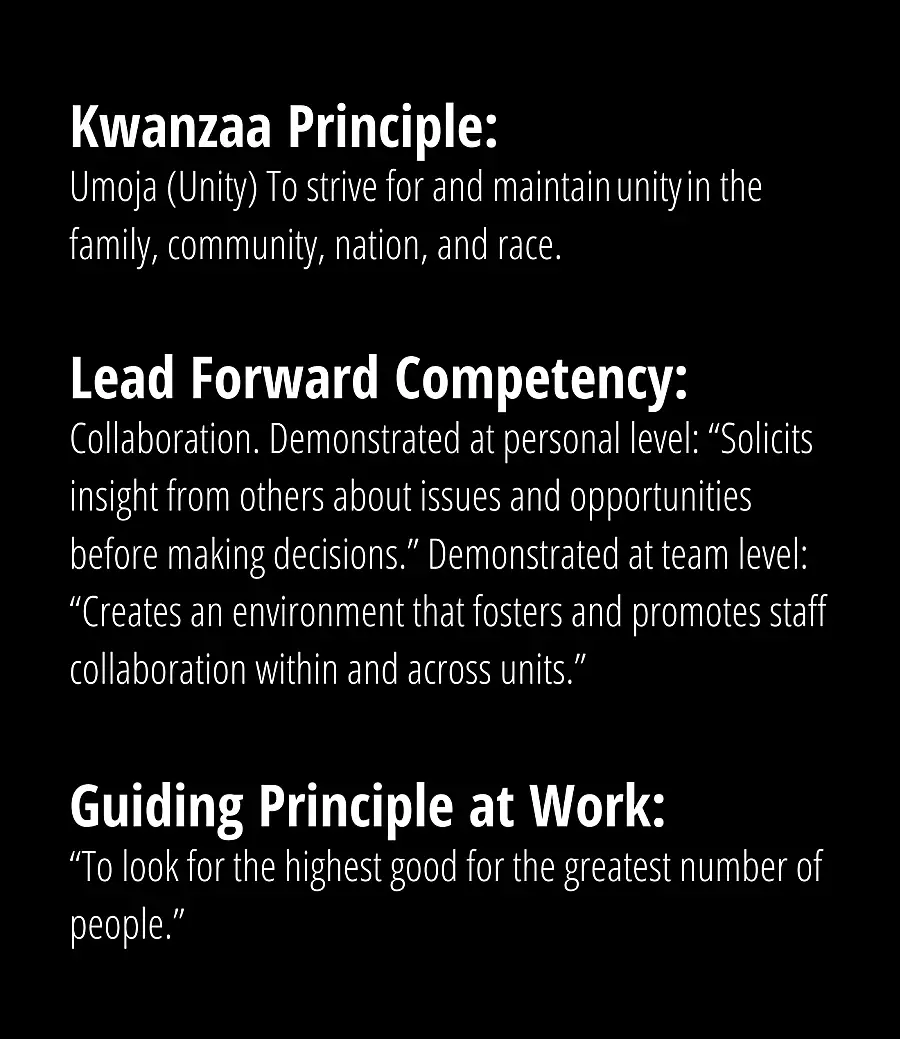This piece was written by Cara Valentino, Senior Manager of the Racial Justice and Equity Program and shared with RTI staff. The opinions expressed in this piece are her own.
I remember it like it was yesterday – the first time RTI’s Black Employee Resource Group (the “BERG”) decided to host a Kwanzaa event at RTI. Kwanzaa is an African American and Pan-African holiday celebrated by millions throughout the world African community and brings a cultural message which speaks to the best of what it means to be African and human in the fullest sense.
The BERG leaders and I were all nervous because we weren’t sure how our celebration would be received. We chose to set up a large, colorful, multi-table display in our main cafeteria, and a smaller display in our mini-cafeteria in another building. We were concerned that it would be awkward – how could we encourage our colleagues to visit the tables we planned to set up?
The planning period was a beautiful time of living the Nguzo Saba, or the seven principles of Kwanzaa, which are: Umoja (Unity), Kujichagulia (Self-Determination), Ujima (Collective Work & Responsibility), Ujamaa (Cooperative Economics), Nia (Purpose), Kuumba (Creativity), and Imani (Faith). We were unified and determined in our intention to share ourselves and our culture with our workplace, and we did this collectively. We were purposeful in our planning – some pooling resources to bake cookies and purchase chocolates to entice our colleagues, while others brought their favorite African art and fabrics for decorations. Our intent was to be as creative as possible, creating handouts explaining each of the seven principles, and dressing in colorful African clothing…with full faith that we had something of value to share and that it would be well received. Yet, we were still nervous.
That first year, we offered baked goods and chocolates to our colleagues who were on their way to lunch and included the mini flyers of the seven principles. Most of our table visitors were Black people, many of whom visibly and noticeably lit up at the display – eyes shining brightly, huge smiles on their faces, and obviously happy to see something of the culture brought into work, to feel a space of belonging.
But we still felt an underlying awkwardness about how to connect Kwanzaa to our work here at RTI. How could we articulate the value of Kwanzaa beyond the obvious value of bringing our whole selves to work, for an hour?
I remember exactly when it hit me – it was performance review time, and I was in a hurry to clean up after the event so I could go write my self-assessment. As I worked with my colleagues to put things away, I noticed that all the cookies and chocolates were gone, but an abundance of the mini-flyers of the seven principles remained - abandoned and in disarray. I felt heartbroken that the true offering had been overlooked. But in that moment, as my heart sank, I could also see that each of the seven principles related to the leadership competencies we are expected to develop and grow as part of our performance management process at RTI. The one that had been evidenced in the planning that was most obvious to me was the connection between Umoja (Unity) and Collaboration.
I remember saying to my BERG colleagues, “Next year we’re going to re-do these flyers and show their alignment to our Lead Forward behaviors. Then we’ll hand the flyers out and tell people how they can use these principles to grow professionally at work.”
The following year we handed out the flyers, and engaged our colleagues in conversation about how to put the principles into action:
“When we are in meetings, making policy decisions, or engaged in creative problem solving, smart ideation and innovation: ask ourselves, is this decision, policy or solution incorporating what might be the greatest good for the greatest number of people? AND what is good for the individual?”
That year’s Kwanzaa event was wonderful. The flyers were well received, the conversations were dynamic and lively. And those flyers and the connection of the Nguzo Saba to our Lead Forward behaviors are still being referenced at multiple levels across RTI. I’ll remember the experience forever.
And what about today? How can we intentionally advance the principles? We can start by being intentional about advancing diversity of thought in our decision-making process. I invite you to try it – in the very next discussion, decision or dialogue you have with someone, bring in Umoja by asking: What would serve the greatest good for the greatest number of people?
After all, isn't this what it means to be human in the fullest sense?


